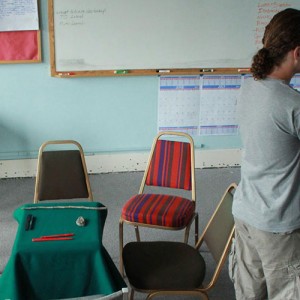Evan and Willem meet Hunter, a new friend, at a coffee shop during a day of WAYK demonstrations for a local high school. They spend the lunch hour talking about a very important issue in WAYK – the addiction of mainstream-schooled language learners to books, over fluent speakers.
1. Technique “Dictionary Addiction“
- Hunter asks what we mean by this technique.
- Willem says: “the addiction indicates the limiting belief that life, skill, competency, all are found in books, not in people.”
- Languages keep changing. Books (dictionaries) can only show a snapshot in time.
- Evan explains the impossibility of transcribing the variety and subtlety of speech-song of a language.
2. Technique “Accent“
- Say you want to learn English. Which kind? Which dialect? Which accent? From where? Academic English, or the vernacular of the street?
- Evan speaks about the seductive distraction of the dictionary.
3. Technique “Fluent Fool“
- If you have a “fluent fool“, and you can “language hunt“, you don’t need any other tools. You can begin a conversation right there.
- The commercialization and consumerization of language learning.
- Evan makes a reference to a movie you haven’t seen. Sorry. Willem knew what he meant.
4. Technique “Superman III“
- Willem explains “Superman III” for the umpteenth time. Maybe we need a new technique name…
5. Technique “Accent“
- Hunter talks about Portland’s accent. Each accent is it’s own justification, it belongs to it’s own people and place.
- Willem talks about a series of audio recordings, “Acting with an Accent”, that teach accents by a method of training “resonance chambers”, rather than just switching letter sounds around.
- Evan wishes dictionaries would transcribe language with a kind of musical notation.
6. Technique “Language Hunting“
- Willem says dictionaries are actually lists of questions, not answers. Does this word really sound that way, as written? When? In different contexts? And how does its meaning change?
- Trust the “fluent fool“, not the dictionary. Use the dictionary to help you hunt the “fluent fool“, by giving you useful questions to ask the “fluent fool“.
7. Technique “Mumble“
- Don’t go for perfection. Make lots of “mistakes”, experiment, explore language, language hunt!





